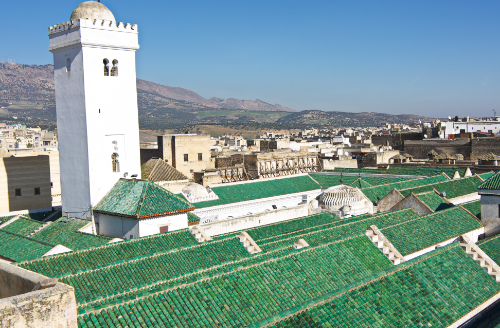Bologna, Oxford, Cambridge, and Heidelberg are cities where some of the world’s important universities are located. Bologna University in Italy was established in 1088, Oxford University in the United Kingdom in 1096, and Salamanca University in Spain in 1134, making them the oldest universities in Europe.[1]
If we go back to the year 859, we reach the founding year of the world’s oldest university. This university is the University of al-Qarawiyyin, established in the city of Fes in Morocco by Fatima al-Fihriya. Both UNESCO and Guinness World Records state that the University of al-Qarawiyyin is the oldest continuously operating educational institution in the world.[2]
Fatima al-Fihriya was born in the year 800 in Kairouan, located within today’s borders of Tunisia, into a respected, religious, and knowledgeable family. The family, as if wanting to demonstrate how much they desired to be among those honored individuals mentioned in the hadith of the Prophet Muhammad (peace be upon him), “Whoever raises two daughters until they reach adulthood and treats them well, I and that person will be like this on the Day of Judgment,”[3] placed great importance on the education of Fatima and her sister. Despite the family’s modest financial situation, the two sisters received advanced education. In 824, during the expulsion of Arabs from southern Spain and Tunisia, Fatima and her family were forced to migrate, and they came to Fes, where her father would become a successful merchant in the future. Following the migration wave, Fes became an important center where Arab culture thrived in North Africa and earned the name “Muslim West” of its time.
Fatima married and moved away from her family to Fes, but soon after, she lost her father, her brother, and her husband. Fatima and her sister inherited a considerable amount of wealth from their father. The two sisters, who reached an economic comfort level to live their lives comfortably, began to contemplate what they could do next. With the horizon provided by their education, they decided to build two mosques to meet the worship and educational needs of the city and its inhabitants.[4] Fatima also planned to build a madrasa next to the mosque.[5] One of the hadiths that likely inspired her is “Acquiring knowledge is an obligation on every Muslim, male and female.”[6]
In the beginning of Ramadan in the year 859, Fatima began the construction of the University of al-Qarawiyyin. Fatima closely supervised the construction of the mosque. She paid special attention to ensuring that the buildings were within the boundaries of the purchased land and that the materials used in the construction were sourced through their own resources. This date also became the founding year of the University of al-Qarawiyyin.
The al-Qarawiyyin madrasa initially started its educational activities in theology and Quranic studies. As the university grew, it began to offer education in logic, mathematics, and the natural sciences. It is rumored that renowned Islamic scholars such as Muhyiddin ibn Arabi and Ibn Khaldun received their education from this university when they came to Fes.[7] Additionally, from its inception, the University of al-Qarawiyyin served as an important bridge for cultural and academic exchange between the Western world and the Islamic world. It is reported that significant figures such as Pope Sylvester II, Nicolas Clénard,[8] and Maimonides[9] received education at this university. The university continued to develop itself and managed to etch its name in the history books once again: The al-Qarawiyyin University Library became the world’s first university library. This library contains significant information about Islamic history.[10]
Fatima utilized the inheritance left by her father wisely and did her best for the future generations. She took on the responsibility of being at the helm of the madrasa to share her knowledge with everyone. She fulfilled her responsibilities in the best way possible as a truth-seeker, a term often described by esteemed Fethullah Gülen Hodjaefendi, who said, “We call someone an intellectual who deeply investigates the issues they handle with a love for knowledge and truth, who thoroughly examines, knows well, and expresses and presents that knowledge with moral courage.”[11]
[1] https://oxfordsummercourses.com/articles/oldest-universities-in-the-world/
[2] https://www.dailysabah.com/life/history/al-qarawiyyin-worlds-oldest-continually-operating-university-was-founded-by-a-muslim-woman
[3] Sahih Muslim, Birr, 149.
[4] https://www.musikexpress.de/fatima-al-fihri-die-gruenderin-der-allerersten-universitaet-der-welt-1848701/
[5] https://www.İslamiq.de/2019/03/08/fatima-al-fihri-gruenderin-der-ersten-universitaet-in-marokko/
[6] Ibn Majah, Muqaddima, 17.
[7] https://www.islamiq.de/2019/03/08/fatima-al-fihri-gruenderin-der-ersten-universitaet-in-marokko/
[8] In the 16th century, he served as a professor at Leuven University in Belgium.
[9] A Jewish philosopher and lawyer who lived between the years 1135 and 1204.
[10] https://wir-staerken-maedchen.de/vorbild/fatima-al-fhiri/
[11] https://herkul.org/kirik-testi/entelektuel-ve-dirilis/




